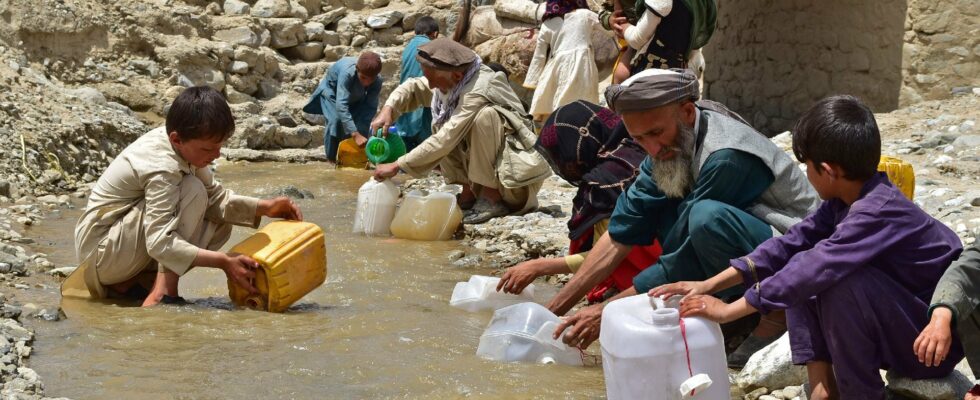This is a small line in the “legislature contract” of the New Popular Front (NFP). A still vague proposal, slipped into the part of the program entitled “Guarantee a dignified welcome”. She suggests “creating a climate displaced person status”, and brings to the forefront a long-debated concept. “The idea comes up regularly when a government or a party wants to give the impression of being interested in the issue, but I do not think that it is with a statute that we will resolve this essential problem,” judges the specialist. questions of geopolitics, environment and migration François Gemenne.
Massive floods, unprecedented heat waves, devastating storms… With human-caused global warming, certain parts of the globe are increasingly affected by extreme weather phenomena.
In 2023, displacement linked to these disasters affected more than 20 million people worldwide, according to the Observatory of Internal Displacement Situations. And the phenomenon is accelerating: between 2008 and 2022, this mobility increased by 41%. As a result, population movements are becoming a major subject. And a scarecrow for part of the right and the extreme right, who have been denouncing the left’s program on the migration issue for many years.
Mostly internal travel
In this context, the proposal of the New Popular Front would have deserved more clarity. Because for the moment, it generates more questions than answers. Representatives of the NFP, from the Greens to those responsible for La France insoumise, have mainly spoken in recent months about the status of “climate refugee”.
However, the terms “displaced” and “refugee” overlap distinct legal and climatic realities. The framework of the 1951 Geneva Convention, relating to the status of refugees, does not recognize environmental grounds, but only gives the right to international protection in the event of war, religious or political persecution. “The term chosen in the NFP program can refer to internal or international displacement. Is the aim sought to achieve international status, within the framework of climate negotiations, or to determine a framework for internally displaced persons? ‘inside French territory?’, asks Christel Cournil, professor of public law at Sciences Po Toulouse.
This question is essential. The immense share of movements of populations affected by the consequences of global warming takes place in their country of residence, or in neighboring countries. “A “climate displaced” status would only concern a small part of the demand for reception in France, because in the areas affected by these disasters, populations simply cannot travel such distant distances to seek refuge. with us”, underlines François Gemenne, who refutes the idea of an explosion in immigration if such a status were to be created.
“We sometimes think that we will resolve everything through the law”
In addition to the legal debate, the other question that arises is that of the qualification of climate change. If part of the world’s population is directly threatened by climate change – such as the inhabitants of small island states such as Tuvalu or Karibati, exposed to rising sea levels – a majority of current displacements are linked to situations where political crises , climatic and economic are intertwined. “A farmer who can no longer cultivate his land due to drought linked to climate change can also be described as an economic refugee because he no longer has income. We also know that the lack of water can underlie conflicts, thus opening up recognition of refugees due to wars”, underlines Yves Pascouau, researcher at the University of Nantes and elected under the Public Place label at the town hall.
For others, the urgency is not there. “There are a number of measures that we could take, rather than creating a specific status for climate refugees, and which would have an immediate effect,” judges François Gemenne. The researcher, who participated in the writing of one of the IPCC reports, mentions the Platform on Disaster-Related Displacement. An international initiative, responsible for protecting populations, of which France held the rotating presidency in 2019. “No one talks about it. However, it is an interesting lever,” he judges.
At the international level, the subject of a specific status does not seem to constitute a central question for the countries of the South either. Major discussions at international climate summits, such as the COPs, have focused on how to obtain financing for countries’ adaptation to climate change, or on responses to post-disaster consequences, with the topic of “loss and damage”. François Gemenne agrees: “Most of the thinking in the countries of the South concerns the capacity to deliver aid, or the levers to finance it. We sometimes have this bias, in France, of thinking that we are going to do everything to be regulated by law. A way of saying that the debate on the climate emergency deserves better than a hypothetical status.
.
